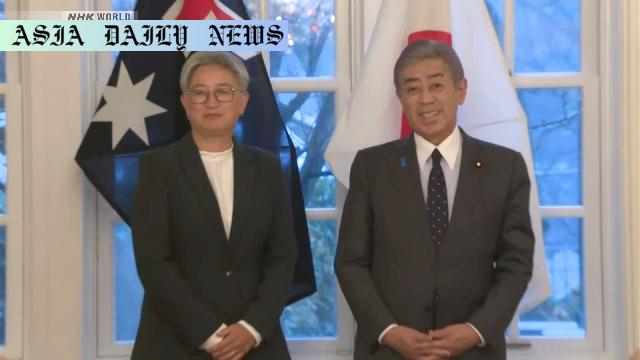Japan and Australia to collaborate with the US and like-minded nations for a free and open Indo-Pacific.
Japan and Australia aim to bolster ties with the US for an open Indo-Pacific.
Meetings focus on multilayered security, economy, and Quad cooperation.
Commitments to cybersecurity and people-to-people exchanges confirmed during bilateral talks.

Japan and Australia have opted to strengthen their regional cooperation efforts in collaboration with the United States and other like-minded countries, aiming to promote a free and open Indo-Pacific. This decision was detailed following a bilateral meeting between Japan’s Foreign Minister Iwaya Takeshi and his Australian counterpart, Penny Wong, in Washington this past Sunday.
During the meeting, Iwaya emphasized the increasingly complex and severe strategic environment in the Indo-Pacific region. He stated that this provides an opportunity for Japan and Australia to lead by example and work hand in hand with the United States to foster peace and development. The ministers agreed that part of their plan to strengthen cooperation includes working within the Quad—a strategic framework comprising the United States, Japan, Australia, and India.
This collaboration goes beyond geopolitical strategy, as both nations reaffirmed their commitment to ensuring security in cyberspace, enhancing economic cooperation, and fostering strong people-to-people exchanges between Japanese and Australian citizens. This multifaceted approach signals their intent to integrate security, economic stability, and cultural ties into their long-term strategy for a resilient Indo-Pacific.
The ministers recognized the importance of the Quad and committed to further developing this strategic alliance, which has grown in relevance due to geopolitical competition and challenges in the Indo-Pacific region. Steering their discussions toward practical action, Japan and Australia highlighted the need to deliver on prior commitments, especially in the areas of cybersecurity and technological innovation—two areas seen as critical to the future stability of the region.
Furthermore, Japan and Australia appear aligned in their efforts to deepen economic cooperation. From sustainable trade practices to prioritizing resilient supply chains, both nations are keen to reinforce economic partnerships that can withstand global challenges. With the rise of economic vulnerabilities often tied to geopolitical issues, such collaboration is aimed at maintaining a balanced and robust regional economy. This partnership ties directly into efforts to boost regional connectivity, particularly in Southeast Asia and the broader Indo-Pacific region, where economic influence remains a pivotal factor.
An equally important pillar of their collaboration includes increasing people-to-people exchanges. These exchanges are expected to enhance cross-cultural understanding and contribute to closer ties at the grassroots level, further strengthening the bilateral relationship between the citizens of Japan and Australia.
In terms of upcoming events, Japanese Foreign Minister Iwaya is scheduled to attend the inauguration ceremony of US President-elect Donald Trump on Monday. This visit underscores the critical timing of these discussions, as it allows both Japan and Australia to align their Indo-Pacific strategies alongside the new US administration’s priorities. Talks are also underway to arrange meetings with Trump’s nominees for key roles, including Marco Rubio as secretary of state, in addition to a Quad foreign ministers’ meeting.
The strengthening trilateral relationship among Japan, Australia, and the United States not only exemplifies their shared commitments but also underscores the urgency of collective action in light of the challenges confronting the Indo-Pacific region. These joint efforts promise increased stability and prosperity across this strategically important area, setting a strong foundation for future engagement.



Commentary
The ongoing developments in Japan and Australia’s partnership with the United States to promote a free and open Indo-Pacific indicate a significant step in global diplomacy. The Indo-Pacific has become one of the most geopolitically sensitive regions in recent years, and aligning efforts by these key nations suggests a proactive approach to ensuring stability and fostering collaboration.
The emphasis on a multilayered cooperation framework reflects not only the complexity of modern challenges but also the evolving nature of international alliances. This move is particularly timely given the dynamic and often unpredictable nature of global politics. It is encouraging to see nations like Japan and Australia work toward strengthening their ties amid growing uncertainties, particularly when dealing with issues ranging from cybersecurity threats to economic vulnerabilities.
What stands out in these discussions is their focus on practical and actionable goals. The inclusion of cybersecurity as a key area of cooperation mirrors the digital era’s growing challenges. In addition, the focus on comprehensive economic and cultural collaboration demonstrates that these nations are not merely aiming to improve defense strategies but are working toward holistic, long-term partnerships that will benefit their citizens directly.
The Quad’s role in this partnership cannot be ignored. As a strategic framework, it represents a shared vision among major democratic powers to maintain a rules-based international order. The reaffirmation of the Quad’s importance in these talks signals the growing relevance of such alliances and their potential to address regional security and economic issues comprehensively.
Yet, while this partnership holds promise, it is essential to address the challenges as well. Forming alliances and committing to agreements are merely the first steps; implementing these strategies and ensuring tangible results is a far more demanding task. Success will depend on how well these nations can navigate diplomatic hurdles, manage economic disparities, and maintain their commitment to shared values.
In conclusion, Japan and Australia’s commitment to regional cooperation with the United States and like-minded partners represents a forward-thinking response to contemporary geopolitical challenges. By focusing on multidimensional approaches, such as the Quad, cybersecurity, economic resilience, and cultural exchanges, these nations are paving the way for a more inclusive and stable Indo-Pacific. While challenges remain on the path ahead, the steps taken thus far serve as a testament to the power of collaboration and shared purpose in global affairs.